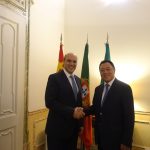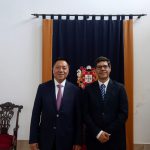 The Secretary for Economy and Finance, Mr Leong Vai Tac, meets with the Minister of Economy, Mr Pedro Siza Vieira, in Lisbon, Portugal.
The Secretary for Economy and Finance, Mr Leong Vai Tac, meets with the Minister of Economy, Mr Pedro Siza Vieira, in Lisbon, Portugal.
The Secretary for Economy and Finance, Mr Leong Vai Tac, had – while visiting Lisbon in Portugal – meetings with Portuguese officials, to seek extension of cooperation in the fields of youth entrepreneurship, MICE (meetings, incentives, conferences and exhibitions), e-commerce, and the training of financial professionals.
During his visit to the capital of the Portuguese Republic, Secretary Leong had meetings respectively with the Minister of Economy, Mr Pedro Siza Vieira and the Secretary of State of Internationalisation, Mr Eurico Brilhante Dias.
In the meeting with Minister Vieira, Mr Leong stated the Macao Special Administrative Region (SAR) Government was determined to develop specialised financial services. This vision was to complement the goal – stipulated in the outline development plan for the Guangdong-Hong Kong-Macao Greater Bay Area (Greater Bay Area) – to transform Macao as a renminbi clearing centre for Portuguese-speaking countries.
Specialised financial services could be a major area for cooperation between Macao and Portugal, said Mr Leong. He added that both sides were already working to act as a joint platform to serve mainland China and the European Union in relation to financial services.
Mr Leong also mentioned that the role assigned to Macao in the advancement of the Greater Bay Area could help facilitate exchanges – regarding youth entrepreneurship – between Portugal and Greater Bay Area cities other than Macao.
Minister Vieira said he paid close attention to Macao’s social development, in particular the robust achievements over the 20 years since its establishment as an SAR. The Minister said he agreed there were ample opportunities for cooperation between Portugal and Macao.
In a separate meeting with Secretary Dias, Mr Leong stated Macao’s ‘Platform’ role was not only a significant step to make use of the city’s inherent strengths in its effort to diversify its economy, but also a crucial point for Macao’s further ties with Portugal and other Portuguese-speaking countries.
The term Macao ‘Platform’ refers to developing Macao as a commercial and trade cooperation service platform between China and Portuguese-speaking countries.
Mr Leong also gave a briefing on the preparation of the 6th Ministerial Meeting of the Forum for Economic and Trade Co-operation between China and Portuguese-speaking Countries; and on the 2019 edition of the “Summit on Chinese Central SOEs Supporting Macao as Co-operation Platform between China and Portuguese-speaking Countries”.
During the meeting, Secretary Dias said he saw huge potential for Portugal and China to strengthen cooperation on cross-boundary e-commerce, following in-depth discussions held previously with officials from Macao’s economic affairs and financial authorities.
Mr Leong additionally had a separate meeting in Lisbon with officials from AICEP Portugal Global, the country’s trade and investment agency, in order to discuss how the two sides could strengthen investment and explore cooperation on valued-added industries.
While in Lisbon, Mr Leong also met with the Ambassador of the People’s Republic of China to the Portuguese Republic, Mr Cai Run.
During that meeting, the two officials exchanged views on a number of topics, including: how to advance effort to promote in Portuguese-speaking countries Macao’s traditional Chinese medicine sector; how to foster cooperation in order to promote Macao’s financial services and the training of financial professionals; and how to make use of Macao’s unique advantages and its ‘Platform’ role in serving China and Portuguese-speaking countries.



